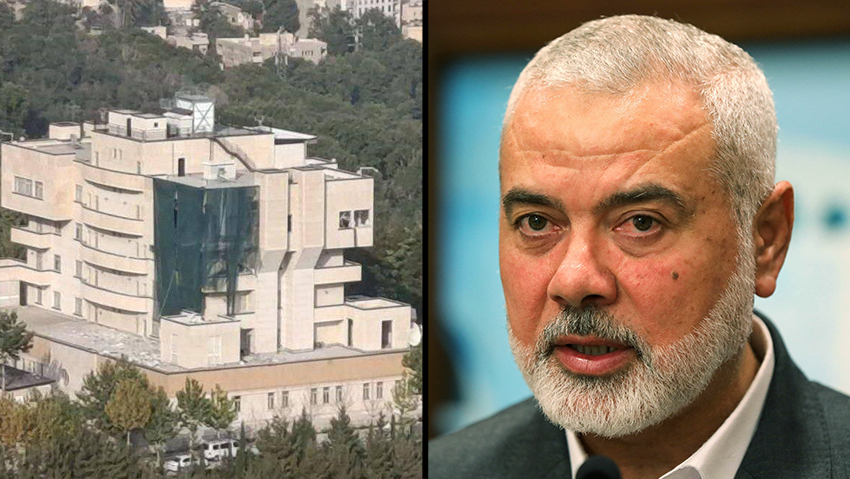Getting your Trinity Audio player ready...
The Iranian Revolutionary Guard Corps (IRGC) announced on Saturday afternoon that Hamas leader Ismail Haniyeh was assassinated not by a bomb, as suggested by Western media reports, but by a short-range missile fired from outside his room. The missile reportedly had a seven-kilogram (15-pound) warhead.
"This act of terrorism was planned and executed by the Zionist regime, with support from the United States government. The adventurous and terrorist Zionist regime will pay dearly for this crime," a statement read. "The retaliation will be severe and will occur at the appropriate time, place and method."
1 View gallery


The Tehran guesthouse in which the assassination took place; Hamas leader Ismail Haniyeh
(Photo: REUTERS/Mohamed Azakir/File Photo)
Earlier, the Iranian state news agency Tasnim also dismissed New York Times and Telegraph reports claiming that Haniyeh was killed by a bomb. However, this denial may stem from the regime's embarrassment over the significant breach of security, as Israel allegedly managed to infiltrate agents into the IRGC guest compound in Tehran and assassinate a high-ranking regime guest within it.
Meanwhile, the Times reported Saturday morning that dozens of arrests have been made following Haniyeh's assassination, including senior officers. The Telegraph reported that the explosives were planted months earlier by agents within the IRGC. According to the British paper, citing Iranian sources, the assassination was facilitated after Mossad hired Iranian security agents to plant explosives in three separate rooms in the building where Haniyeh was staying.
The report noted that the original plan was to assassinate Haniyeh in May when he arrived in Iran for the funeral of former President Ebrahim Raisi, who died unexpectedly in a helicopter crash. However, the plan was aborted due to the large crowd in the building where he was staying and the high risk of failure.
Two senior Iranian sources told the British newspaper that, instead, the two agents hired by Mossad planted explosives in three rooms in the IRGC guesthouse in northern Tehran, where Haniyeh might have stayed. Security cameras captured the agents moving quickly and stealthily, entering and leaving the rooms within minutes, according to sources who viewed the footage. The operatives then fled Iran but maintained an information source within the country.
Early Wednesday morning, from outside Iran, the agents detonated the device placed in Haniyeh's room, as he had arrived in the country for the inauguration ceremony of the new president, Masoud Pezeshkian.
Ismail Haniyeh's coffin arrives in Qatar from Iran
“They are now certain that Mossad hired agents from the Ansar al-Mahdi protection unit,” an official within the IRGC told The Telegraph from Tehran, referring to an IRGC unit responsible for the safety of high-ranking officials. “Upon further investigation, they discovered additional explosive devices in two other rooms.”
A second IRGC source said that "this is a humiliation for Iran and a huge security breach," noting that a team has been established to develop ideas to present the assassination of Haniyeh in a way that diverts attention from the security breach.
“It’s still a question for everyone how it happened, I can’t make sense of it. There must be something higher up in the hierarchy (collaborating with Israel) that no one knows about,” he added.
The first source who spoke with the Telegraph described an ongoing blame game within the IRGC, with different departments accusing each other of the failures that led to Haniyeh's assassination.
Since the assassination, IRGC Quds Force Commander Esmail Qaani has summoned operatives for dismissals, arrests and possibly even executions, according to the source, emphasizing that "the breach has humiliated everyone."






